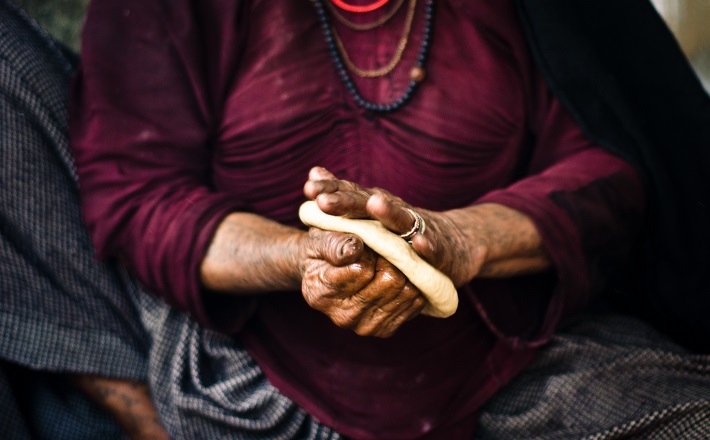Commentary on Amos 8:1-12
Amos was the earliest of the prophetic books, focused on the ultimate consequences of Israel’s disobedience.
Its powerful language, its focus on the destructive capabilities of God, and its concern for systemic social justice issues offered a turning point in prophetic proclamation in its time, during the reigns of Judean king Uzziah (783-742 BCE) and Israel’s king Jeroboam II (785-745 BCE). Both nations seem to be in a time of relative peace, seeking to enlarge their territories.
Amos focuses generally on the sovereignty of God, but specifically on God’s sovereignty over nature and ability to use nature destructively toward the people of Israel. No other biblical book emphasizes the destructiveness of God as much as Amos. Though God established covenant relationship with Israel, their repeated unjust behavior has prompted God to end the relationship, compelled to do something new.
Amos 8:1-3 offers the fourth vision reported in Amos, appearing in the same format as the third vision (7:7-9). Beholding a bowl of summer fruit — typically high in water content, sweet, and refreshing — God says to Amos that the end is coming after which God will not pass by the people of Israel again; they will weep in the temple, with corpses strewn and scattered. The Hebrew word qes here can mean “summer” or “ripe fruit harvested at the end of summer.” God’s response to Amos uses this same word, in a word play turn of phrase: “the time is ripe” for God to cut off. Elsewhere in the text, qes is used eschatologically, but here it certainly refers to the end of a people, making 8:2b perhaps the most extreme statement in the entire book of Amos.
If you find yourself squeamish upon reading to this point, you are exhibiting a normal human reaction of resisting acknowledgment of death and destruction, especially any concerning ourselves. The reality in which Amos found himself was sufficiently devastated that all he can see for the future is death.
The people of Israel, Amos accused, have created a system which perpetuates injustice. Not only is their worship inauthentic, but they have oriented everything about themselves to how they can exploit one another for monetary gain. The wealthy have objectified the poor, trading them as commodities. Makers add rubbish to their wares, peddling it as quality. Even religious holidays have become central days of exploitation and anticipation of future exploitation. The language of 8:6 reminded me of the level of desperation depicted by “Master of the House” from Les Miserables, in which the inn owners repeatedly defrauded, robbed, and exploited their guests for monetary gain.
The level of injustice described here far exceeds individual acts of bigotry. Certainly individuals acted with bigotry and hatred toward others. More than this, however, the system was set up to perpetuate the power of those already in power, to perpetuate the wealth of those already wealthy, and to do both at the expense of the poor and powerless. Owners of the means of production used hiring and compensation practices which guaranteed the exponentially increasing impoverishment of laborers, effectively forcing them into enslavement. Because of this impoverishment and disenfranchisement, the poor exploited the poor, and the entire society was organized according to domination rather than love for neighbor, as God intended. Amos doesn’t specify the wealthy as the oppressors, but rather the oppressor is anyone who practices injustice.
God knows what Israel has done, for no deed done in the dark can go unnoticed by God. Religion cannot assure them that everything will be alright when it will not. Religion can offer no comfort to these people, for the just response of religion is their judgment. Amos utilizes liturgical formats typically offering assurance of God’s pardon, now turned on their heads to assure God’s judgment and inability to forgive their evil.
Israel may have found God’s word easy to ignore leading up to Amos’s proclamation, but now, God will withhold God’s word from them. They will struggle without meaning or purpose until their ultimate destruction. They will pine for a word from God and find only deeper, meaningless suffering.
God is the sovereign creator of the world and called Israel as a covenant community of God. God cares about the oppressed, the poor, and the exploited, which Israel did not honor in their systemic perpetuation of injustice against each other. God is as if not more concerned about systemic justice as individual piety. Personal morality cannot exonerate someone from complicity with an unjust system.
This text raises a critical identity question for the church today: What are we doing with the word God has given to us? When we cast our cares on buildings, programs, and social status, we squander and ignore the word of God revealed in the biblical text and freshly revealed to us through Christian discipleship. When we fail to love our neighbor as ourselves, when deny shelter to the refugee, when we judge the oppressed for their oppression, when we disregard the one because we are content with the ninety-nine, we have violated God with our evil. When we are complicit with evil regimes that rend children from their parents, delight in the destruction of others, and use people as means to build wealth and power, we have violated God with our evil.
No weekly frequency of quiet times, dollar amounts donated to good causes, kind letters to missionaries, seeming propriety, or any other “good church behavior” can exonerate us from God’s judgment on us for perpetuating injustice. The people of God were called to participate in God’s project of love for the world, but instead of loving each other, they brutalized one another.
God’s call to the church is to be the hands and feet of God in the world, offering love, working for each other’s good. Such a calling is incompatible with systemic injustice, which compels the people of God to actively combat oppressive systems like racism, classism, sexism, heterosexism, ageism, ableism, etc. Though churches in crisis claim that they seek God’s word for them, their focus too often remains on externals, rooted in love of self and the unquenchable thirst for “enough” power/domination/gain.
As Donald Gowan wrote, “If we ignore the word God has set before us, what more can God do for us?”1
Though the people fail God, God is never failing. God will create something new out of the death of the chosen people, God says to Amos. Do not rush to find resurrection and miss this opportunity to dwell on the truth of God’s justice. Who are we crushing? Who are we enslaving? Upon whose graves are we building our towers? When we seek God’s voice, what idols have deafened us from truly hearing God?
Notes:
1 Donald Gowan, “Amos,” in The New Interpreter’s Bible v. 7, edited by Michael Lawrence, pp.337-432 (Nashville: Abingdon Press, 1996): 419.
References:
Aaron, Jr., Charles L. Preaching Hosea, Amos, and Micah (St. Louis, Chalice Press, 2005).
Carroll R., Mark Daniel. Contexts for Amos: Prophetic Poetics in Latin American Perspective (Sheffield, UK: Sheffield Academic Press, 1992).
Gowan, Donald, “Amos,” in The New Interpreter’s Bible v. 7, edited by Michael Lawrence, pp.337-432 (Nashville: Abingdon Press, 1996).


July 21, 2019